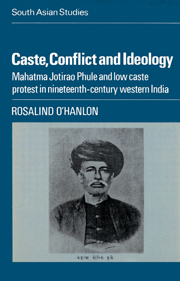 Caste, Conflict and Ideology
Caste, Conflict and Ideology Book contents
- Frontmatter
- Contents
- Acknowledgements
- Notes on translations and area under study, with map
- Part 1 Introduction
- Part 2 Religion and society under early British rule
- Part 3 Jotirao Phule and his circle: the emergence of a distinctive radical voice
- Part 4 The creation of a lower caste identity in history and popular culture, 1869–73
- Part 5 The lower caste community in contemporary society
- Part 6 Ideology and the non-Brahman movement in the 1880s
- 15 Phule's polemic in the 1880s: the ideological construction of rural life and labour
- 16 The non-Brahman movement in the 1880s
- 17 Epilogue: ideology and politics in nineteenth-century western India
- Bibliographic note
- Bibliography
- Glossary
- Index
16 - The non-Brahman movement in the 1880s
from Part 6 - Ideology and the non-Brahman movement in the 1880s
Published online by Cambridge University Press: 14 October 2009
- Frontmatter
- Contents
- Acknowledgements
- Notes on translations and area under study, with map
- Part 1 Introduction
- Part 2 Religion and society under early British rule
- Part 3 Jotirao Phule and his circle: the emergence of a distinctive radical voice
- Part 4 The creation of a lower caste identity in history and popular culture, 1869–73
- Part 5 The lower caste community in contemporary society
- Part 6 Ideology and the non-Brahman movement in the 1880s
- 15 Phule's polemic in the 1880s: the ideological construction of rural life and labour
- 16 The non-Brahman movement in the 1880s
- 17 Epilogue: ideology and politics in nineteenth-century western India
- Bibliographic note
- Bibliography
- Glossary
- Index
Summary
Introduction
The difficulties which the Satyashodhak Samaj encountered shortly after its foundation were not the symptoms of a decline in the vigour and attractiveness of its ideas, but rather the opposite. The following decade witnessed a rich flowering of institutional and organisational activity. The original concerns of the society, and Phule's drawing of a closer identification with Maharashtra's cultivators, provided the ideological basis for this activity. Both Phule and other Satyashodhak polemicists had always sought to hold together different, and sometimes contradictory, ideas and symbols, and the resulting ambiguity was just what gave Satyashodhak ideology its tremendous appeal. This very diversity allowed new leaders to concentrate on their own areas of organisation, whilst maintaining a larger orientation held in common with others who identified themselves in some way with the cause of the lower castes. With this simultaneous continuity and dissension, the non-Brahman movement provides a fascinating example of the relationship between ideas and political organisation under British rule.
All groups within the non-Brahman movement united in agreeing on the extreme inequality of Maharashtrian society. Those who laboured on the land and in the new urban centres formed the vast majority of the population, and contributed almost all of the revenues of the Bombay government. However, the much smaller numbers of those who made a living in administrative, professional, and other clerical and service roles had monopolised the benefits of education and employment under British rule.
- Type
- Chapter
- Information
- Caste, Conflict and IdeologyMahatma Jotirao Phule and Low Caste Protest in Nineteenth-Century Western India, pp. 274 - 302Publisher: Cambridge University PressPrint publication year: 1985


